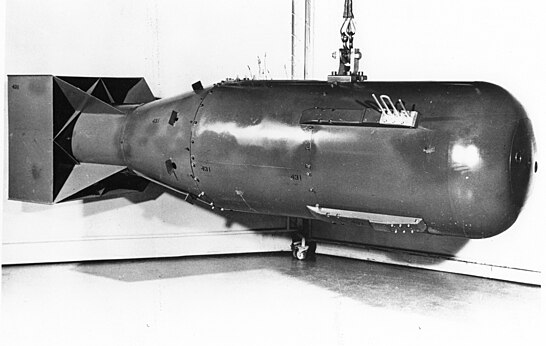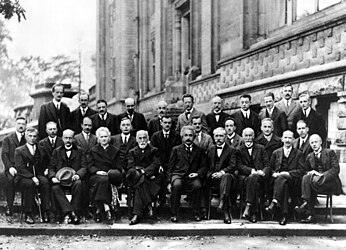User:CoolChemist/sandbox
 | This is a user sandbox of CoolChemist. You can use it for testing or practicing edits. This is not the sandbox where you should draft your assigned article for a dashboard.wikiedu.org course. To find the right sandbox for your assignment, visit your Dashboard course page and follow the Sandbox Draft link for your assigned article in the My Articles section. |
Practice
Subdisciplines
See also: Outline of chemistry § Branches of chemistry
Chemistry is typically divided into several major sub-disciplines. There are also several main cross-disciplinary and more specialized fields of chemistry.[1]
- Analytical chemistry is the analysis of material samples to gain an understanding of their chemical composition and structure. Analytical chemistry incorporates standardized experimental methods in chemistry. These methods may be used in all subdisciplines of chemistry, excluding purely theoretical chemistry.[2]

In analytical chemistry, spectroscopy studies interactions between electromagnetic radiation (light) and matter[3]. A spectrophotometer is a machine used to measure the effect light has on matter. The model pictured is the Beckman DU-640 - Biochemistry is the study of the chemicals, chemical reactions and interactions that take place at a molecular level in living organisms. Biochemistry is highly interdisciplinary, covering medicinal chemistry, neurochemistry, molecular biology, forensics, plant science and genetics.[4]
- Inorganic chemistry is the study of the properties and reactions of inorganic compounds, such as metals and minerals.[5] The distinction between organic and inorganic disciplines is not absolute and there is much overlap, most importantly in the sub-discipline of organometallic chemistry.

The Kaminsky catalyst is an organometallic complex that features either zirconium or hafnium metal centers. Depending on the placement of the catalyst's cyclopentadiene ligands, it can produce polypropylenes with different tacticity.[6] 1 creates atactic polypropylene, which is soft and amorphous with a free-flowing composition. 2 creates isotactic polypropylene, which is hard and used in re-usable plastic containers. 3 creates syndiotactic polypropylene, which is rubbery and semi-crystalline.[7]
- Materials chemistry is the preparation, characterization, and understanding of solid state components or devices with a useful current or future function[8]. The field is a new breadth of study in graduate programs, and it integrates elements from all classical areas of chemistry like organic chemistry, inorganic chemistry, and crystallography with a focus on fundamental issues that are unique to materials. Primary systems of study include the chemistry of condensed phases (solids, liquids, polymers) and interfaces between different phases.
- Neurochemistry is the study of neurochemicals; including transmitters, peptides, proteins, lipids, sugars, and nucleic acids; their interactions, and the roles they play in forming, maintaining, and modifying the nervous system.
- Nuclear chemistry is the study of how subatomic particles come together and make nuclei. Modern transmutation is a large component of nuclear chemistry, and the table of nuclides is an important result and tool for this field. In addition to medical applications, nuclear chemistry encompasses nuclear engineering which explores the topic of using nuclear power sources for generating energy[9][10]

The Little Boy is an atomic bomb utilizing a uranium-235 fission reaction.[11] By firing sub-critical uranium into another mass of sub-critical uranium within the bomb, a self-sustaining nuclear reaction (the critical mass). It generated an explosive force of over 15,000 tons of equivalent TNT - Organic chemistry is the study of the structure, properties, composition, mechanisms, and reactions of organic compounds. An organic compound is defined as any compound based on a carbon skeleton. Organic compounds can be classified, organized and understood in reactions by their functional groups, unit atoms or molecules that show characteristic chemical properties in a compound.[12]

4-Hydroxybutanal is an organic compound with an aldehyde (right) functional group and an alcohol (left) functional group. - Physical chemistry is the study of the physical and fundamental basis of chemical systems and processes. In particular, the energetics and dynamics of such systems and processes are of interest to physical chemists. Important areas of study include chemical thermodynamics, chemical kinetics, electrochemistry, statistical mechanics, spectroscopy, and more recently, astrochemistry. Physical chemistry has large overlap with molecular physics. Physical chemistry involves the use of infinitesimal calculus in deriving equations. It is usually associated with quantum chemistry and theoretical chemistry. Physical chemistry is a distinct discipline from chemical physics, but again, there is very strong overlap.
- Theoretical chemistry is the study of chemistry via fundamental theoretical reasoning (usually within mathematics or physics). In particular the application of quantum mechanics to chemistry is called quantum chemistry. Since the end of the Second World War, the development of computers has allowed a systematic development of computational chemistry, which is the art of developing and applying computer programs for solving chemical problems. Theoretical chemistry has large overlap with (theoretical and experimental) condensed matter physics and molecular physics.

The Solvay Conference of 1927 featured foundational scientists to the field of theoretical chemistry and physics. This conference discussed electrons and photons
Others subdivisions include electrochemistry, femtochemistry, flavor chemistry, flow chemistry, immunohistochemistry, hydrogenation chemistry, mathematical chemistry, molecular mechanics, natural product chemistry, organometallic chemistry, petrochemistry, photochemistry, physical organic chemistry, polymer chemistry, radiochemistry, sonochemistry, supramolecular chemistry, synthetic chemistry, and many others.
- ^ "Chemistry Subdisciplines". www.thecanadianencyclopedia.ca. Retrieved 2024-04-01.
- ^ "Analytical Chemistry". American Chemical Society. Retrieved 2024-04-01.
- ^ Skoog, Douglas A.; Holler, F. James; Crouch, Stanley R. (2018). Principles of instrumental analysis (7th ed.). Australia: Cengage Learning. p. 120. ISBN 978-1-305-57721-3.
- ^ "Studying Biochemistry". www.biochemistry.org. Retrieved 2024-04-11.
- ^ "Inorganic Chemistry". American Chemical Society. Retrieved 2024-04-01.
- ^ Kaminsky, Walter (1998-01-01). "Highly active metallocene catalysts for olefin polymerization". Journal of the Chemical Society, Dalton Transactions (9): 1413–1418. doi:10.1039/A800056E. ISSN 1364-5447.
- ^ "Polypropylene". pslc.ws. Retrieved 2024-04-11.
- ^ Fahlman, Bradley D. (2011). Materials Chemistry (1st ed.). Dordrecht: Springer Netherlands Springer e-books Imprint: Springer. pp. 1–4. ISBN 978-94-007-0693-4.
- ^ "Nuclear Chemistry". American Chemical Society. Retrieved 2024-04-11.
- ^ "21: Nuclear Chemistry". Libretexts. 2014-11-18. Retrieved 2024-04-11.
- ^ "Little Boy and Fat Man - Nuclear Museum". https://ahf.nuclearmuseum.org/. Retrieved 2024-04-11.
{{cite web}}: External link in|website= - ^ Brown, William Henry; Iverson, Brent L.; Anslyn, Eric V.; Foote, Christopher S. (2018). Organic chemistry (8th ed.). Boston, MA: Cengage Learning. p. 19. ISBN 978-1-305-58035-0.




